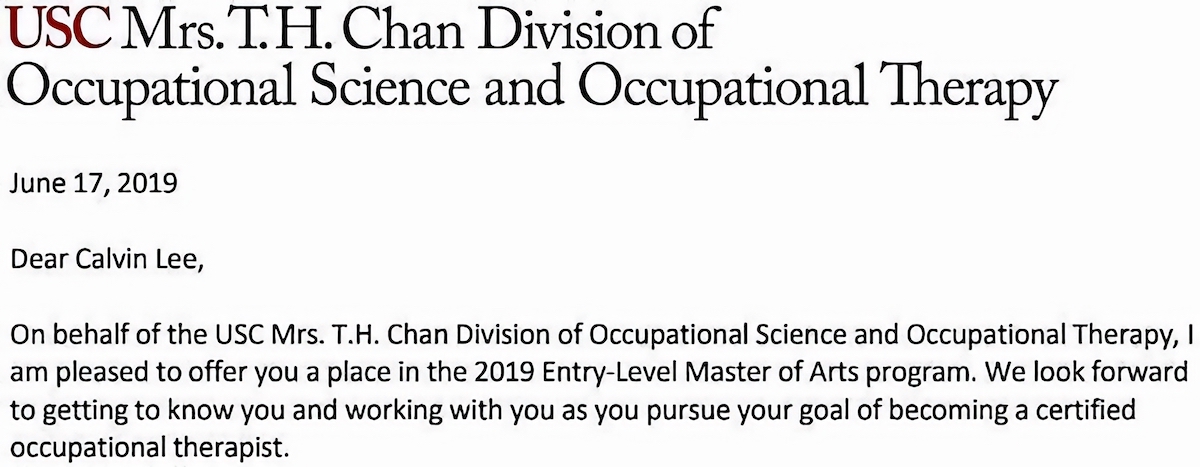Student Blog
Life Hacks

Seeing Rejection as Redirection ⟩
November 16, 2020, by Calvin
Admissions Life Hacks
When the November 1st application deadline passed, I started thinking back to when I first applied to USC Chan about 3 years ago. Wait a minute . . . am I doing that math right? I started the program in June 2019, so how does that make sense? Well, let me tell you!
I already knew that I wanted to pursue OT when I was a senior in undergrad. I really only wanted to go to USC and I also wanted something to start doing right after graduating. So, I had submitted my application to just USC Chan for their 2018 entry cycle.
During the waiting process, I would always keep up with online OT graduate school forums where prospective students would share their stats, where they went for undergrad, who they heard back from, and when they heard back. It was like being addicted to “College Confidential” when I was applying for undergrad (if anyone remembers what that is)! I was also searching for a forum thread from previous years to see when the admissions committee had sent out results so I could kind of gauge when they would send it out during the year that I applied. From what I had read, it seemed that March was the month that results typically got emailed out, so I was mentally preparing myself for that. However, I also knew that things change each year and that I shouldn’t be frantically checking my email.
One night in February though, I was out with friends and we were just hanging out. The thought of admissions decisions wasn’t even on my mind at the time, but my phone was set to show email notifications on my lock screen. I saw an email with the subject line “USC Occupational Therapy”. I was completely freaking out and my friends watched me as I read the first sentence in the email.
My heart sank and I felt numb. I ended up telling my friends that I was going to head home early and I just laid in my bed, staring at the ceiling. It didn’t fully hit me that night because I was so unprepared for the news. The next morning, I had work and when I parked my car, I just sat inside crying my eyes out, feeling like I had failed and that I wasn’t deserving to be an occupational therapist. I kept thinking to myself, “What’s wrong with me?” and, “If I can’t get in this time, what makes me think I can get in next time?”
However, I knew that if I let these thoughts take over, I wasn’t going to get anywhere. I later responded to the email asking if I could meet with the admissions committee to see what parts of my application could be improved. They were happy to accommodate my request and I took a visit to the division a few weeks after. They were so open to giving me constructive feedback on my application and they also took the time to reassure me while encouraging me to reapply the next year.
So, during the following cycle, I applied to USC again, as well as to a handful of other programs. Although attending USC was my dream, my end goal was to become an occupational therapist, and by applying to other schools I could increase my chances of joining the profession. So, I went through another round of waiting games of hearing back from the programs. I ended up being accepted into the other programs, but I was waitlisted to USC this time. My first thought was “okay . . . this isn’t a rejection and this is still an improvement from last year.” I was truly grateful to the other programs for offering me a seat, but I knew that my heart was set on USC, so I decided to make the wait.
The thing about being on the waitlist is that it’s not a yes or a no and it’s so unpredictable that the admissions committee can’t guarantee what will happen. It was a pretty rough time for me during the wait and I was just praying for that congratulatory email to come my way, but I didn’t hear anything for quite some time. Fast forward to the morning of the first day of class for the entering class — I was still on the waitlist. At this point, I knew that I wasn’t getting in and I was actually preparing to pack my bags to head to a different program. Then, I got a phone call that afternoon.
I had no idea who was calling, but when I picked up I heard the news that ultimately changed my life. It was a call from admissions team representatives, Dr. Kristin Nxumalo and Dr. Arameh Anvarizadeh, telling me that a space had just opened up and asking if I wanted it. Honestly, that moment was such a blur. I just remember that I was losing my mind from all the excitement and I kept saying “YES” and “THANK YOU”! It was a pretty last-minute decision considering that I had to be ready to come to school the next day, but it all ended up working out.
Now, I’m here! I’m here living out my dream of becoming an occupational therapist in my dream school. I never expected it to happen like the way it did, but I’m beyond grateful for the journey and I’ve learned so much along the way.
I won’t lie though, I felt pretty undeserving and there were a lot of feelings of impostor syndrome since I had come off the waitlist so late. However, I remember during that first day, I walked down the aisle of the G-37 auditorium towards Dr. Samia Rafeedie, so that I could introduce myself and inform her about my situation. I was feeling nervous, but I’ll never forget how kind and understanding she was. When she told me, “you belong here”, that was when I started to actually feel like I did. I’m thankful everyday for the supportive community of faculty, staff, and students, for giving me so much strength and for reminding me that I do deserve to be here.
Rejection hurts, and I know that I’ll continue to experience rejection down the road. But that’s just how life works. There are times when things go my way, and there are times when things just don’t turn out the way I had hoped. However, I always try my best to remind myself that things happen for a reason. As admissions decisions approach, it’s going to be a stressful time waiting to hear back. Do what you need to do during this time and treat yourself with compassion.
Congratulations to all of you who’ve submitted your applications this cycle! You did it! When I was a prospective student, I found comfort in reading Student Ambassador blogs. Here are some that I think might be helpful for all of you during this time.
- So, You Have Submitted Your Application: Lamoni shares tips and advice on what you can do after you’ve submitted your application.
- I’m waitlisted . . . now what?: Liz shares her experience with being on the waitlist.
- Being Waitlisted: Marilyn answers questions alongside fellow students,Daniel and Nicole, about being waitlisted.
The Student Ambassadors and the Admissions Team are available to answer your questions as well.
I know that the wait for admissions decisions to roll out is nervewracking, but whatever decision you receive - don’t let that stop you from being the best OT you can be! I’ll leave you all with this quote that inspired me to share this story: “Every time I thought I was being rejected from something good, I was actually being redirected to something better.” — Steve Maraboli
⋯

You didn’t come this far to only come this far ⟩
November 13, 2020, by Yna
Life Hacks
It’s Friday! Should I dare say “TGIF” when I’ll be facing final exams next week? Probably not! It’s incredibly hard to believe that we’re only a week away before the fall semester comes to a close. It’s been roughly a 3-month long semester of online classes, asynchronous lectures, countless readings, presentations, and assignments. I was so caught up in juggling all these requirements for weeks on end (plus a part-time job as a student ambassador on top of it all), that they all just seemed endless—and yet here I am, already working on completing all the final requirements for the courses I enrolled myself in. As I try to let this reality sink in, various mixed feelings inevitably surface.
Do I feel ready for the finals? Did I really learn everything that I needed to in class? To be honest, I have spent the last few weeks feeling anxious about this upcoming exam week. I had always been this very organized person who likes to stay on top of things; however, the rigorous workload oftentimes just left me feeling overwhelmed. Adding to this are feelings of loss of control brought about by the myriad of things happening in the outside world that I cannot simply detach myself from, despite just being cooped up in my room practically all day.
Somehow, I managed to pull through one day, week, and month after the other; that I had barely noticed the time swiftly passing by. As I was starting to prepare myself to study for the exams, sifting through all the course materials, I couldn’t help but question myself if I had really absorbed a whole semester’s worth of learning (I guess we’ll find out in a week or so, right? Stay tuned for my next entry!).
A little reassurance for myself (and anyone of you who needs it) would have to do for now: you didn’t come this far to only come this far! I personally find it helpful when I remind myself of the time I was in this same fearful state as I was just about to enter the program a couple months ago: being a new immigrant to this country, struggling to find a support system, adjusting to the remote learning setup—all while having to deal with problems concerning personal relationships. It wasn’t exactly the ideal way to start the semester; nevertheless, here I am, halfway done through the program!
This is not to say that I made it here all on my own, though. My ever-supportive family, my very encouraging professors who are always willing to support their students in any way, my MA1 classmates whom I constantly meet with virtually whether it’s to create reviewers together or simply hang out, and the amazing friends I met at USC Chan along the way—all have brought me here. I encourage everyone to draw strength from your support systems, most especially when the going gets tough.
Good luck to all those students taking their final exams next week! As always, Fight On!
⋯

Meaningful Occupations in the Reinberg-Rivera-Ritter Household ⟩
November 12, 2020, by Liz
Life Hacks Living in LA
As OT students it’s so easy to get caught up with work, class assignments, and other responsibilities. It’s so easy that we forget how important it is to take care of ourselves and take some time to engage in meaningful occupations! This year I have had the pleasure of living with two of my best friends, Lorelei and Renee. Over the course of being in this program, we’ve really gotten to know each other. I don’t know what I would do without them! I thought it would be cool to share some pictures of some of the meaningful occupations we’ve been engaging in to relieve some stress and spend some time together as a family.
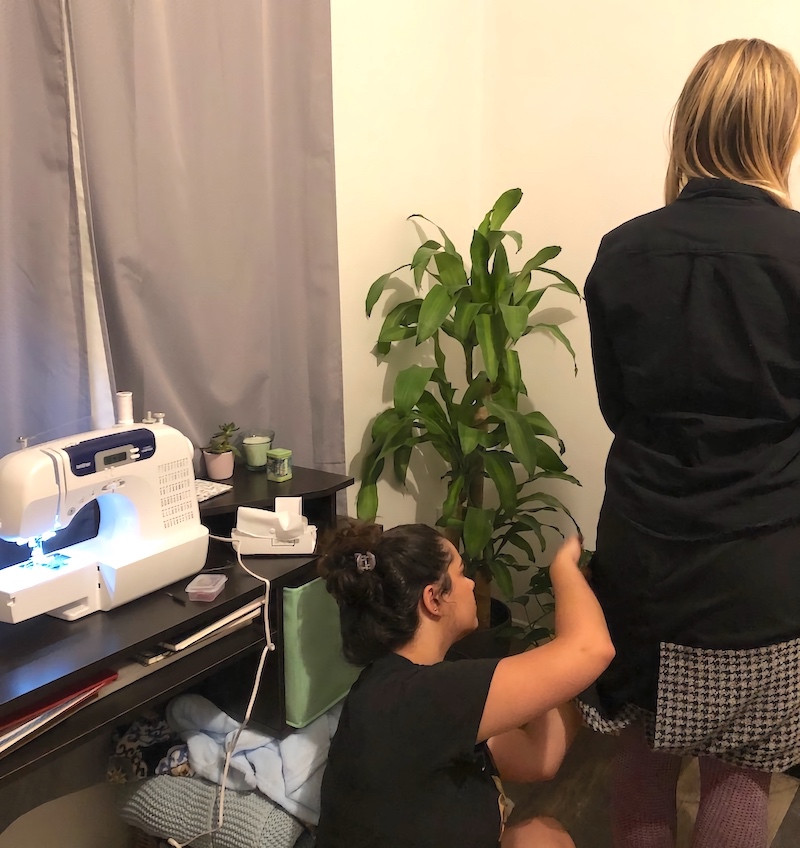
Renee just recently got a sewing machine, and so of course Lorelei put her to work! Here she is attempting to professionally hem Lorelei’s skirt. So yes, we now have our very own seamstress in the house! The only downside is that her work may take more than 10 business days to complete.
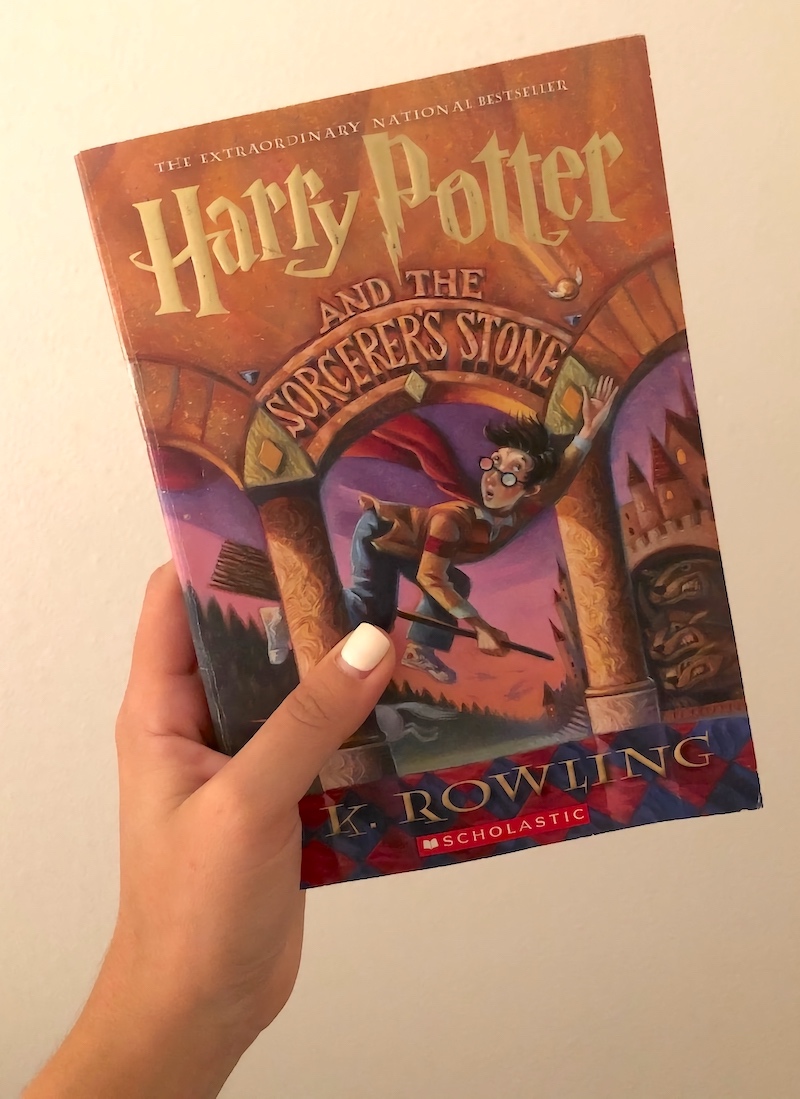
As a kid, I used to love playing outside with my friends. Whenever I think about my childhood I think about running around the apartment complex and racing around in scooters with my friends. My elementary school used to have a thing called AR (not sure if that is still a thing), in which we would have to accumulate a certain number of points by reading books. I really did not like reading books as a kid because I loved being outside playing with my neighbors. As I got older reading became more enjoyable of course. So, now I have decided to read the entire Harry Potter series, which I never read as a kid!
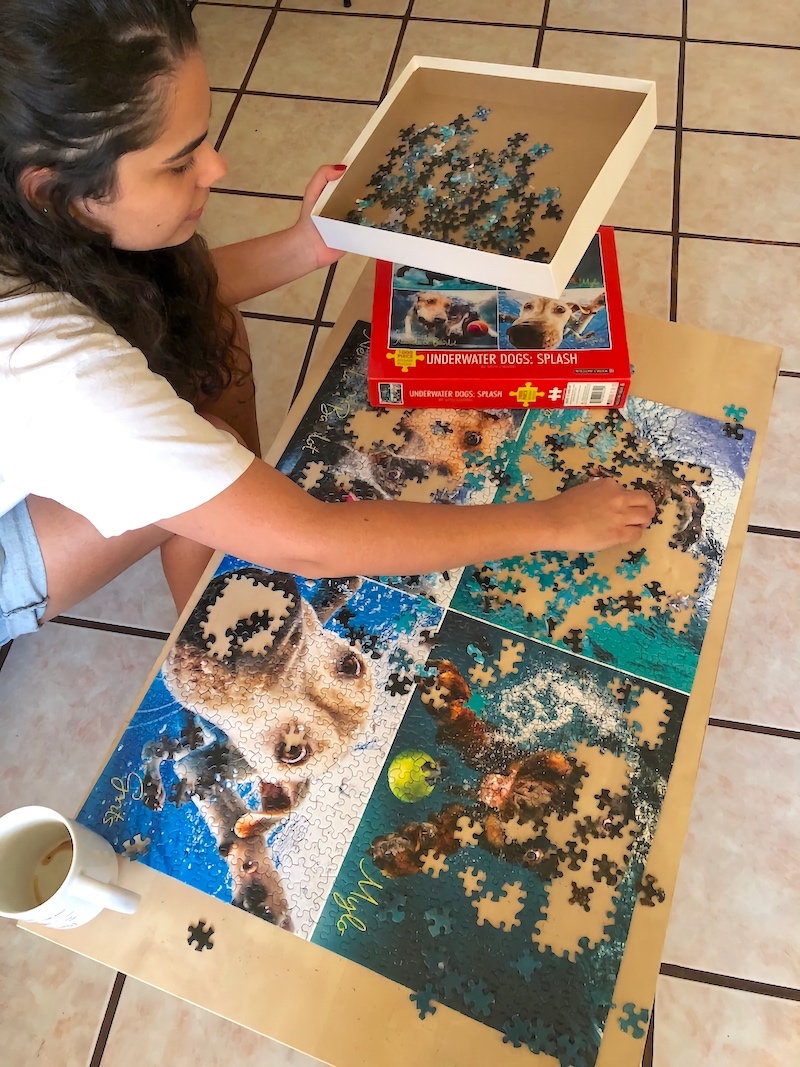
Here’s Renee taking a little study break. We started working on a 1,000 piece puzzle as a household, but I have to admit most of the work was done by Lorelei and Renee. There are way too many shades of blue, green, and white in there. I did cheer them on from the couch, though!
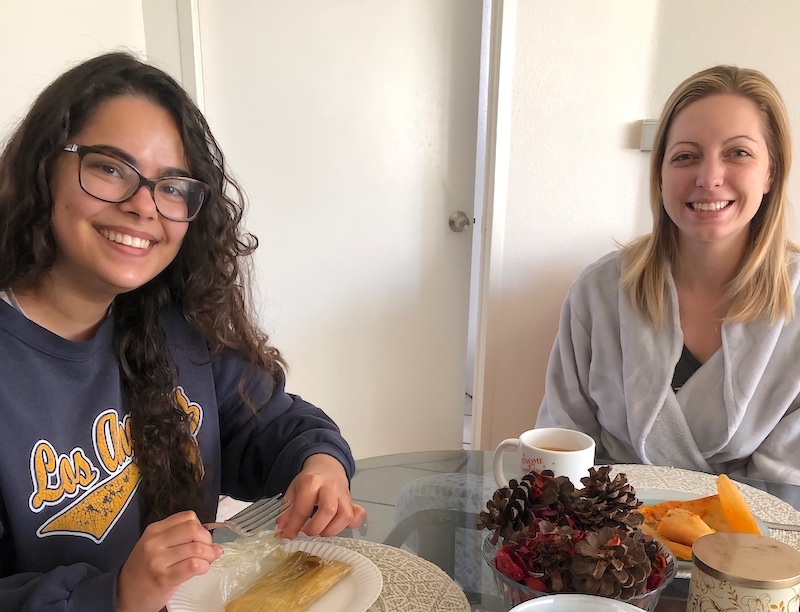
One of the most beautiful parts of living in East Los Angeles — delicious food everywhere! I woke up early before class to buy us some tamales so we could enjoy a little breakfast. Yum!
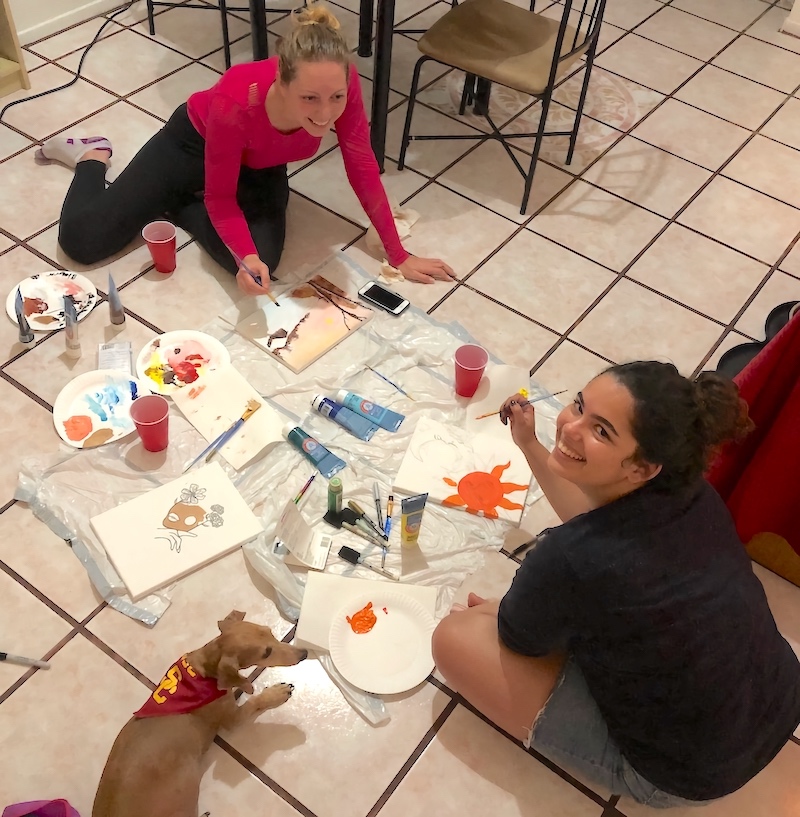
And lastly, here we are enjoying a little paint night! Lorelei was painting something for her mom, I was painting a gift for my little sister’s birthday, and Renee was painting something for her room. We were playing holiday music because both Renee and Lorelei will be going back to the east coast for the holidays. And Maxy is supervising of course.
These pictures bring me so much joy! I am so lucky to have the best roomies in the world. As an OT student in our program you can expect to receive a great education and learn from some of the best OTs out there. But, you can also expect to develop beautiful friendships with some amazing people!
⋯
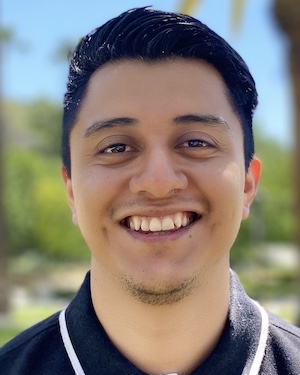
My Support System ⟩
October 26, 2020, by Daniel
Diversity Life Hacks
This past week I received the best news ever, “WE” passed the NBCOT exam! The reason I say “WE” is because I attribute every big accomplishment to my support system. Yes, they will always say that I’m the one that put in the work but I feel that my accomplishments are and always will be a collective effort. Where I come from, it often takes a village to do what very few have done before. This past weekend made me reflect back on my support system and their unconditional love and support. I have been fortunate to have people in my corner every step of the way. Being the first person in my family to go to college came with a set of challenges that at times felt unmanageable. From thinking college wasn’t an option in high school to now being in the OTD Program it has been a long journey to say the least. Last Wednesday, when I opened that email with the NBCOT score, I felt a sense of relief as well as gratitude because I know what it took for me to get here, to be one huge step closer to being a fully licensed OT. This is much bigger than me because it goes back to the hardships my parents and my community have faced.
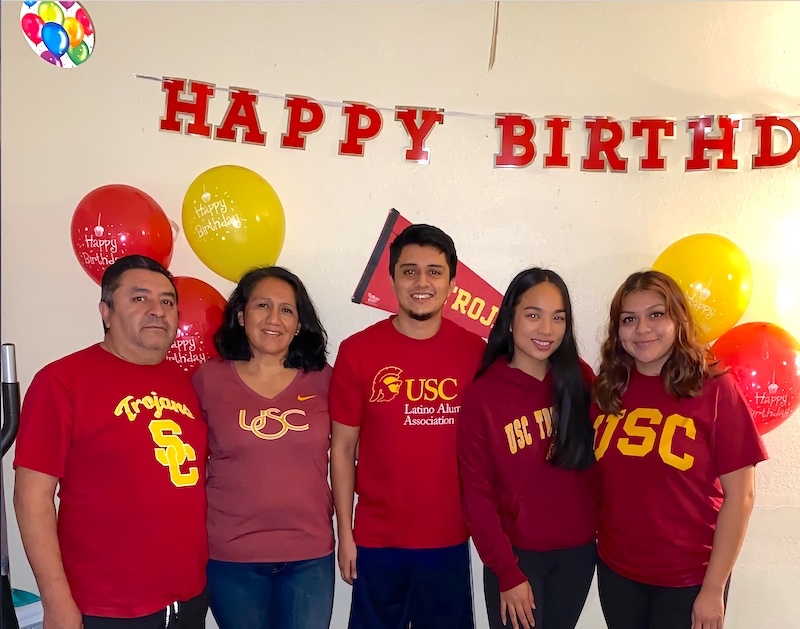
There have been moments in the last couple weeks when I felt defeated while taking classes, completing my residency, going through life, and studying for the NBCOT. It is in these moments that it helps to lean on your support system. Whether that is your family, significant other, friends, classmates, mentors, school organization, etc., it is good to know that there is someone there for you. Having people checking in on me, giving me good vibes, and understanding that I had to spend almost every day studying helped me get closer to the finish line. Sometimes a quick encouraging text can go a long way for someone. And I think this has been the theme of my entire college career, having people that cared enough to make sure I was doing okay mentally, emotionally, and physically. Today I want to simply thank every single person that has made an impact on my journey. The list is too big to add on here today but you know who you are.
This year has been such a unique year as we had to completely change our lives. It has been a year of ups and downs, and times full of uncertainty. All of this plus the responsibilities we still have on a daily basis can make anyone feel overwhelmed. If you ever feel like you are just drowning in school work and other responsibilities, take a moment to reflect on how far you have come. Remember those long nights when you used to have conversations with your loved ones about going to OT school and now you’re here. Hold on to those moments and use them when times get tough. When things don’t go your way, take time to feel those emotions, heal, and when you’re ready get back to it because there is always more than one path. Know that regardless of the outcome your support system, your village, your people, will be there to help you get back on your feet. They will not judge you, and instead will respect you and care for you. Now more than ever it is important to stay connected to your support system. Spend time with those people, whether that is in person, FaceTime, Zoom, whatever way you can. One thing I have learned is that accomplishments always feel best when you can share them with the people that were there along the way. Lastly, take all those lessons you learned along the way and support others.
⋯

Finding Faculty Mentorship ⟩
October 5, 2020, by Calvin
Life Hacks
Having come from a large public university for my undergrad, I didn’t feel like it was as accessible to connect with professors and find that kind of professional mentorship. So once I got into this program, I was surprised to discover how available and how approachable the faculty truly are. There is an exceptional range of faculty and, although they may have a ton of things on their plate, I’ve found that something they all have in common is that their doors are always open to students.
However, while I am grateful to be able to call some of the faculty my mentors, I definitely remember how nerve-wracking it was to step outside of my comfort zone to reach out to them. Towards the beginning, I had these thoughts of, “should I only be talking to the professors that teach my classes?”, “what do I even say to them . . . .”, and “will it look like I’m kissing up?” I know that it feels like there’s a lot of pressure to fully use the resources available at USC Chan, so I want to share some information on how I established mentorship and some overall tips and advice for all of you trying to move forward in this process!
Trust in the process:
- I know that, even after hearing how friendly the faculty may be, they still might seem a little out of reach and maybe even scary to get in touch with, especially with those that don’t teach your courses. I felt the same way, and I would always think that I would be wasting their time if I asked to talk to them about their experiences, interests, life, etc. But speaking from experience of going through this process, just know that they’re here for you, they feel for you, and they really are open to being reached out to if you ever need anything.
They’ve been in your shoes before:
- Before, it had never occurred to me to think about how the faculty here were students too. Well, they were! Some of them are actually alumni of USC Chan, and so they know a thing or two about the classes we’ve taken, the practice areas we might be interested in, and the challenges we’ve gone through to get here. The faculty are people too, and they know what we’ve gone through and will go through, so don’t be afraid to get in contact with them because they might be able to relate and give you some pointers along the way.
Do your research:
- Go onto the Faculty Directory page and do some exploring! There’s also a dropdown menu that can guide you to a specific group of faculty. We have faculty that have a range of various experiences and expertise, so take some time looking over their biographies, research interests, and interests in general. You never know what you might be able to find! If someone doesn’t teach any of your classes, don’t let that stop you from reaching out to them. Maybe someone conducts research that you find fascinating or maybe someone is an alum from your previous school! Have fun with this experience because it’s like a little sneak-peek into each of the faculty here!
Just hit the send button:
- I remember when I was way too nervous to even send an email to them. I really just wanted to introduce myself, share why I’m interested in their work, and learn more about how they got to where they are. However, I was afraid of the chance that they might not respond or that they might be annoyed that I’m bothering them. But I realized that there is nothing to lose! If they don’t respond, then follow-up with them. Faculty get a mass amount of emails every day, so sometimes things get lost in the flood. If you think they’re not interested, then maybe it’s not a good fit or maybe you can ask to talk with them over a Zoom call/in-person (once we can do that again). Sometimes it’s hard to analyze someone’s attitude over an email and the faculty are busy people too. It might be that they don’t have time to respond or to write out a thorough email, so give them some time and check-in as needed.
Know what you want:
- What qualities are you looking for in a mentor? Do you want someone to help with your professional development? Do you want someone to just have chill conversations with? What about both? It’s okay if the first faculty that you interact with doesn’t automatically feel like a mentor for you. The process takes time! As much as you want to find the right fit, the faculty also want to see if you’re the right fit for them. So, before you reach out to someone, you should at least have some idea of who they are and what they do, as well as what you want out of the mentorship experience. This is so that you and the faculty can picture what the potential mentorship could look like. Also, with all that being said, you aren’t limited to just one faculty mentor; you are free to build these relationships with as many faculty as you want! Just continue to remind yourself why you’re searching for mentorship and be realistic with your expectations.
Benefits of mentorship:
- I’ve found that my faculty mentors have provided me with different, but strong benefits. Some provide me with affirmations to my skills, some are just nice to have casual conversations with, and some are really good at being real with me and keeping me in check! Having faculty mentors can serve as a resource in terms of networking opportunities and letters of recommendation. Mentorship can also come in all kinds of capacities ranging from consistent weekly/monthly check-ins or even just a few times a semester. As a mentee, I want to be able to provide mutual benefit by supporting my mentor and being there for them as well. I also want to pay this mentorship forward by continuing to support prospective students and current students. I’m super lucky to have been able to build this kind of relationship with some of the faculty here and it’s comforting to know that I can always reach out to these people, even after graduating from this program.
It kind of just happens:
- You’re probably wondering: “What’s the step-by-step process to establishing a mentor?”, and what I’ll say is that it’s pretty fluid. The program does set up an actual faculty advisor program by splitting up students into groups and placing them with one faculty advisor per group. The idea is that your faculty advisor may help you to identify and connect with faculty mentors throughout your relationship with them and they can direct you to other resources, as needed. In terms of seeking out a faculty mentor on your own, it’s not really like a “can you be my faculty mentor?” situation. It’s more so just getting in touch with faculty, gradually getting to know each other, sharing experiences, even working together on projects, and so on. I like to think of it as more of a friendship because it kind of just happens as you get to know and interact with them more and more!
Being in graduate school has really made me appreciate the tight-knit community and intimate interactions with faculty. I hope that this gives you some insight into how to get started in establishing faculty mentor relationships. I also hope that this makes the experience seem a little less scary! I tried to be as real as possible so that I could give you all the information that I wish I had when I was in this process. Feel free to reach out to me at .(JavaScript must be enabled to view this email address) if you need anything and good luck!
⋯








